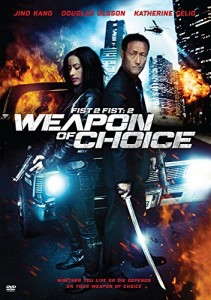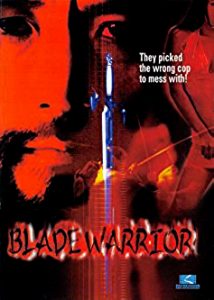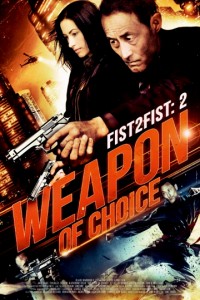Master Jino Kang is the real deal in that he knows how to perform the moves that appear on screen frontwards and backwards due to his dedication to his craft and history with martial arts. However, Kang separates himself from the rest of the action star pack in that he is also a director and writer, a true triple threat. There are a few action stars whom have dabbled in direction before, most notably Sylvester Stallone and occasionally Steven Seagal and Jean-Claude Van Damme, but none whom have primarily produced all of their films from the ground up such as Kang.
The best way that I can describe Kang to those who are unfamiliar with him, is to imagine if writer/director Robert Rodriguez became an action star himself and chose to incorporate his personal believes and skills a-la Seagal into the stories that he tells. While he only has a trilogy of martial arts action under his belt that spans a decade and a half, Kang is a real treat for martial arts fans.
His debut feature, Blade Warrior, was released around the turn of the century. Upon first watch, I was struck by how much the film reminded me of Rodriguez’s debut, El Mariachi. Both films are about as raw as they come, ultra-low budget features that utilize friends, settings, and equipment already available to the filmmakers. Whereas El Mariachi is a neo-western with John Woo touches, Blade Warrior is more so a martial arts cop actioner at a street level.
In all honesty, Blade Warrior somewhat falls in line with other low budget cult favorites like Miami Connection and Samurai Cop with its low production value and ever present martial arts. And while I won’t say that Blade Warrior is the greatest martial arts film ever made, what differentiates it from other “so bad, they’re good” martial arts films is Kang’s filmmaking earnestness and goal to convey a philosophical message that is important to him. There are some rather dynamic shots throughout and an ever present message about self-discipline that showcases an artistic fervor underneath the raw low production value. In my interview with Kang, he called Blade Warrior his ‘student film,’ and therefore, it should be viewed as such. It’s an introduction to an action star who wouldn’t appear on camera again until a whole decade later.
In his second feature, Fist 2 Fist (originally titled Hand 2 Hand), Kang shows an improvement as a filmmaker and as an action star. After all, Fist 2 Fist is quite the production upgrade from the raw 16mm of Blade Warrior. Here, Kang plays essentially the same kind of character from Blade Warrior, a man whom turns his back on violence to focus on teaching martial arts to those whom need self-betterment. With its numerous martial arts training sequences and slightly similar plot, Fist 2 Fist can be seen as an extension of Blade Warrior to the point where it’s a more fully realized version of a similar story. While Fist 2 Fist may have less action than Blade Warrior, or at least from my opinion, the story, themes, and characters are clearer, and in doing so, makes the overall experience much stronger. I couldn’t particularly take the characters from Blade Warrior that seriously, mostly due to the 16mm rawness, but with Fist 2 Fist, I’d be lying if I didn’t say I enjoyed the rag tag group of Kang and his martial arts students.
Kang’s most recent feature, Weapon of Choice (alternately titled Fist 2 Fist 2: Weapon of Choice), is much different from the likes of his previous two films. Whereas his first features are purely martial arts films in every way imaginable, his third film goes for a much broader approach, in that it can be enjoyed by any one, not just martial arts fans. Unlike his first two films, Kang does not play a martial arts teacher or own a school. Instead, Weapon of Choice finds Kang diving into a seedy under world of kidnapping gangsters whom push him to the limit. Therefore, with its kidnapping plot and broader spectrum of action that now includes shootouts along with the fist fights, Weapon of Choice is more along the lines of Taken in that it can be enjoyed by anyone, not just action fans. If I were to compare Kang’s career choice to another’s, think when Sho Kosugi went from Pray for Death to Rage of Honor. They’re both B-action pictures, but one is more focused and centered around martial arts while the other shoots for a broader audience. Overall, Kang’s current martial arts trilogy showcases an artist who is eager to please and dedicated to his craft.
I recently had the pleasure and opportunity to speak with Kang in an interview where we covered a broad selection of topics, ranging from his own filmography, to his martial arts roots, and even what films he admires and looks forward too. In all honesty, it felt more like a conversation than an interview, as Kang was incredibly sweet and very easy to speak with. It was especially fun to geek out with him over other martial arts performers and films:
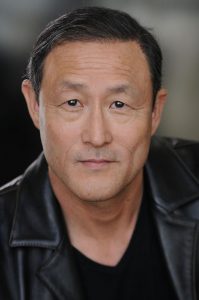
Jino Kang
ZACH NIX: Your films seem very connected in that they incorporate reoccurring themes of self-discipline and martial arts. Is it important to you to incorporate these themes into your films when you set out to make them?
JINO KANG: Yes, because of my martial arts background and all of the other disciplines that I study, it’s definitely an inherent part of me. It’s like one of those things where, it’s in my blood. I like to portray that aspect in my films. I hope I did that.
ZN: Within the first few minutes of watching your debut film, Blade Warrior, I was immediately reminded of Robert Rodriguez’s El Mariachi, an action film with a similar low budget ‘do-it-yourself’ style. Has anyone ever pointed out the similarities between yours and Rodriguez’s film before, and was it possibly a stylistic influence on your own film?
JK: You’re the first!
ZN: Really?
JK: Yeah, yeah. Because they were both shot in 16mm. It has a very grainy look to it. I was actually a fan of El Mariachi as well, I just love the action and the story line of that film. But like Mr. Rodriguez, I shot the opening scene while attending college in the film department. And we borrowed the equipment from there, and we learned how to produce and load the film magazines, and learn the chops. And I think all of that was very similar to El Mariachi and the way it was produced. I call it my student film.
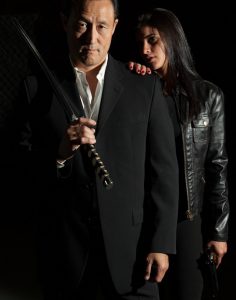
Jino Kang and Katherine Celio in Weapon of Choice.
ZN: Speaking of that opening scene, I have to ask, was that a real apple that you crushed in your hand, or was it a prop designed to be crushed?
JK: No, that is one of my traits that I can do. But I did practice. It’s one of those things that was taught by my father, who was a grandmaster. It’s about having mental and physical strength. I did recently post a video on Facebook, which you can search, but I did it with two hands because it takes a lot of training to do it with one hand. But the scene in the movie was done with one take and one hand.
ZN: After haven watched all of your films, it’s clear that Blade Warrior comes from a different time period than Fist 2 Fist and Weapon of Choice. Why was there such a big gap in between Blade Warrior and your other films?
JK: Many different aspects that came along. When Blade Warrior came out in 2000, late 1999, it was picked up and then there was another year to get it distributed. It was picked up by Saidra Films, and at the time they agreed to do another feature with me. I submitted my script and they loved it, and we were about to do it, and they went bankrupt. And I was training so hard for it and ready to go. And I still have the script and it’s in my back pocket now, I’m too old to do that film now, it’s called Trained to Kill. But one day I’d like to direct that. But that took another year or two years. And you can’t rely on that, you have to make a living. And at the time I was running a martial arts school, which really exploded and took off. And we did really well.
So during mid 2005-06, the school is doing well, and some of the new students came, and you wouldn’t believe all of the resources at my school. Kurt Angle a producer, Christine Lam, whose a line producer, we talked about doing another film. Once that happened, I wrote another script, that’s when Fist 2 Fist was born. It was originally titled Hand 2 Hand, which I preferred, but the distributor changed it. The original title fits the premise of the film, but they changed it because there’s a cage fight in it. It was a little small budget film, under $100,000. We shot about every weekend, and that took another year, and then a year to edit. And in 2009, it was picked up, and was released in 2010, and that went everywhere. It went to Red Box and Blockbuster when it was still around.
ZN: Rest in peace, Blockbuster.
JK: Yeah, I miss it! (laughs) But yeah you name it, it went to all media markets. And then it took another year to write another script, and then another year to get funding. Because I funded myself through private investors, which takes a long time. We shot Weapon of Choice in 2013, and it was picked up immediately, and then distributed in 2014, and released everywhere in 2015.
ZN: Okay, so movie making is a lot of hard work it seems.
JK: Yeah! (laughs)
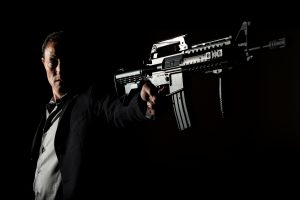
Jino shot first.
ZN: I personally believe that Fist 2 Fist features a more dramatically compelling story and a stronger attention to character than Blade Warrior, if you don’t mind me saying. What did you learn as a filmmaker from your first film to your second that helped to shape you as a stronger story teller?
JK: When Blade Warrior came out, even though it was picked up right away, I got bashed from everyone. People were saying, crappy story, crappy lighting, crappy everything. But I personally thought, hey it’s my story. I want to tell it the way I want too, including philosophies and such. My thought is, if you look at a lot of martial arts films they have no story or plot, and I really want to concentrate on the story and compelling characters who drive the film, and now that I’m looking back, I can see that if there’s no internal struggle than there’s no film. It has to have that arc of the character who has to overcome something and go against odds which makes a compelling story.
ZN: Whereas Fist 2 Fist feels like a definite extension of Blade Warrior, Weapon of Choice feels different from both in that it has a broader appeal due to its gun centric action and kidnapping plot. Was this a specific artistic choice that you made going into the film when making it?
JK: Yeah, I wanted Weapon of Choice to have a universal appeal instead of just martial arts fanatics. I wanted to broaden the appeal to everyone, while still having a cool character with an internal struggle, coming from a hitman to caring about his niece, to becoming a normal person, but because of his dark past, it’s a payback for his sins.
ZN: You are the star, director, and writer of all of your films. Could you ever see yourself playing a supporting, or even a lead role, in a film directed by someone other than yourself?
JK: Yeah! I haven’t put myself out there enough, but the goal for 2017 is to get myself out there more, and I just got an agent. And I’ll put myself out there and we’ll see what roles I can get. I’ll take bad guys, anything, as long as it’s in my range. I would love to do a real dark bad guy. That would be fun.
ZN: Jino, you are clearly the real deal, in that you aren’t just an actor, but a martial arts practitioner first. There was once a time when physically able bodied performers, like yourself, were turned into main stream stars based upon your physical abilities. Unfortunately, times have changed in that actors are now trained to learn the kind of fighting styles and moves that people like yourself know backwards and forwards, instead of the other way around. Do you have an opinion on this shift in mainstream action stardom and how action leads are handled now?
JK: I might (laughs). I think they do a great job, but people like myself have keen eyes, and we can tell when the action and martial arts portrayed is not the real deal. They’ll usually cover it up with shaky camera and insane close ups, to where I’ll say what the heck is happening? I can see he’s punching a guy several times, but I can’t see what’s happening. That’s my feeling, they’re covering up the action and the actors, because they don’t have the ability. They can get away with some of it. But for someone like me, I can see that the ability is not there.
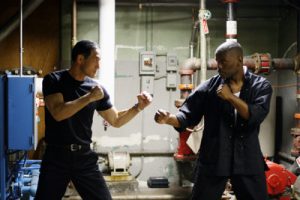
Fist to Fist, literally.
ZN: They also use a lot of obvious stunt doubles where you can’t see their faces.
JK: Yeah, I agree with that.
ZN: This seems to be a common topic amongst a lot of martial arts performers that I’ve spoken with regarding this tactic in mainstream action films.
JK: I also respect the actors, and if you think from Hollywood’s stand point, the actors need to be able to act. I see Hollywood’s point of view, so for people like me, where martial arts is my foremost ability, they should go out and study acting. I do the same thing, when I’m going to do a new part, I’ll take acting classes for a year to sharpen up. So it goes both ways.
ZN: Are there any action films from the past that are either your favorite or influenced you in one way or another?
JK: Definitely all of the Kurosawa films: Yojimbo and Sanjuro. And of course Bruce Lee films. And most recently I would say Ip Man 1 and 2, I haven’t seen 3 yet. And The Raid 1 and 2. High action in those. And if you look at those films, the cameras way back, you can see full figure and see the action because they’re real marital artists. I’m a huge fan of those.
ZN: Most definitely. Those are all great films. Are there any current martial art performers or action stars that you enjoy or have great respect towards?
JK: Yes, I think Scott Adkins is the most phenomenal martial artist out there who is active. He’s on the top of the list. And Cung Le is up and coming. I can’t remember the new actor in Kickboxer: Vengeance.
ZN: Oh yeah, I’m going to butcher his first name, Alain Moussi.
JK: Yeah, he’s Canadian, I think. He’s terrific. He’s a little tight, but if he’d loosen up he’d be great. And also Michael Jai White. Blood and Bone I love that one.
ZN: I just recently watched that one for the first time. I waited a little while to see that one, but as soon as I watched it I was blown away, it was fantastic.
JK: Yeah, it’s a low budget film but with terrific marital arts.
ZN: Yeah, that’s cool you mentioned Cung Le and Scott because they’re in the upcoming Savage Dog together.
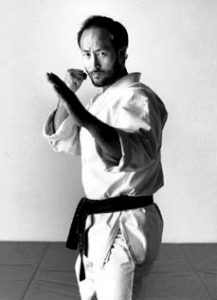
“If you look at anyone whose great, there was a lot of hard work involved. Just get out there and work hard.”
JK: Yeah, Savage Dog, directed by Jesse Johnson. Yeah, that’s coming up. I can’t wait to see that.
ZN: Wow, you know your stuff Jino. We could talk each other’s ears off about action films all day probably.
JK: Yeah, yeah!
ZN: Okay, my final question, do you have any parting words of wisdom to fans of martial arts or those trying to make it in the movie business?
JK: Most important thing is to study your craft and really hone it. Get out there and do it. Don’t let fear stop you from what you want to do. Before you know it, you’re old. You’ve got to get out there and do your work and work hard. You’ll get there. Some people win LOTTO’s, but if you look at anyone whose great, there was a lot of hard work involved. Just get out there and work hard.
ZN: Well thank you very much Jino. It was a great conversation and I had a great time speaking with you today.
JK: Thank you Zach, great questions by the way too!
Special thanks to David J. Moore for setting up this interview.

